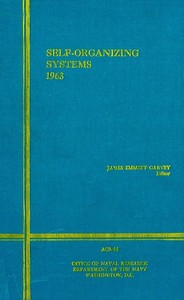Self-Organizing Systems, 1963 by James Emmett Garvey
"Self-Organizing Systems" edited by James Emmett Garvey is a scientific publication written in the early 1960s. This work compiles papers presented at a symposium focusing on emerging research in self-organizing systems, particularly in relation to neural modeling and electrical behavior in biological systems. The book explores various approaches and methodologies in the field, including the Ionic Hypothesis, neuron models, and adaptive learning networks. The opening of the book introduces the foreword by
Garvey, which outlines the symposium's objectives and emphasizes the relevance of the collected papers to a broader scientific audience. The text highlights the significance of self-organization as a concept in understanding complex systems, particularly in relation to biological processes. It sets the stage for the subsequent papers, focusing first on the Ionic Hypothesis and neuron models, which discuss the behavior and modeling of neurons, based on empirical data and theoretical frameworks developed by early scientists. The introduction paves the way for a deeper inquiry into the principles of self-organization in both biological and artificial systems. (This is an automatically generated summary.)
Read now or download (free!)
| Choose how to read this book | Url | Size | ||||
|---|---|---|---|---|---|---|
| Read online (web) | https://www.gutenberg.org/ebooks/66286.html.images | 234 kB | ||||
| EPUB3 (E-readers incl. Send-to-Kindle) | https://www.gutenberg.org/ebooks/66286.epub3.images | 2.3 MB | ||||
| EPUB (older E-readers) | https://www.gutenberg.org/ebooks/66286.epub.images | 2.3 MB | ||||
| EPUB (no images, older E-readers) | https://www.gutenberg.org/ebooks/66286.epub.noimages | 152 kB | ||||
| Kindle | https://www.gutenberg.org/ebooks/66286.kf8.images | 2.3 MB | ||||
| older Kindles | https://www.gutenberg.org/ebooks/66286.kindle.images | 2.3 MB | ||||
| Plain Text UTF-8 | https://www.gutenberg.org/ebooks/66286.txt.utf-8 | 173 kB | ||||
| Download HTML (zip) | https://www.gutenberg.org/cache/epub/66286/pg66286-h.zip | 2.5 MB | ||||
| There may be more files related to this item. | ||||||
Similar Books
About this eBook
| Editor | Garvey, James Emmett, 1917- |
|---|---|
| LoC No. | 66061126 |
| Title | Self-Organizing Systems, 1963 |
| Note | The papers appearing in this volume were presented at a Symposium on Self-Organizing Systems, which was sponsored by the Office of Naval Research and held at the California Institute of Technology, Pasadena, California, on 14 November 1963. |
| Note | Reading ease score: 43.0 (College-level). Difficult to read. |
| Contents | Foreword -- The ionic hypothesis and neuron models, by E. R. Lewis -- Fields and waves in excitable cellular structures, by R. M. Stewart -- Multi-layer learning networks, by R. A. Stafford -- Adaptive detection of unknown binary waveforms, by J. J. Spilker, Jr. -- Conceptual design of self-organizing machines, by P. A. Kleyn -- A topological foundation for self-organization, by R. I. Ścibor-Marchocki -- On functional neuron modeling, by C. E. Hendrix -- Selection of parameters for neural net simulations, by R. K. Overton -- Index of invited participants. |
| Credits | Mark C. Orton and the Online Distributed Proofreading Team at https://www.pgdp.net |
| Language | English |
| LoC Class | Q: Science |
| Subject | Self-organizing systems |
| Category | Text |
| EBook-No. | 66286 |
| Release Date | Sep 13, 2021 |
| Copyright Status | Public domain in the USA. |
| Downloads | 145 downloads in the last 30 days. |
| Project Gutenberg eBooks are always free! | |

